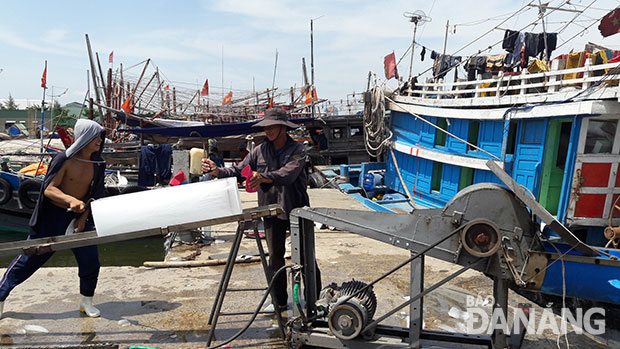Central region's sea safe again for swimming and fishing
The sea water along Viet Nam’s central coastal provinces has now been declared safe for swimming and aquaculture activities, about 4 months after the region was hit by industrial pollution which caused mass fish deaths.
 |
| Local seafood traders at a market |
The news was officially announced in a statement by the Ministry of Natural Resources and the Environment at a meeting on Monday in Quang Tri Province. It comes as good news for both fishermen and seafood consumers in Da Nang, and in the central region as a whole.
According to Professor Mai Trong Nhuan, the former President of the Viet Nam National University in Ha Noi, the test results of water samples taken from 19 beaches across the 4 affected provinces from Ha Tinh to Thua Thien-Hue showed that all parameters were now within normal limits. Most notably, the amount of toxic substances measured at the bottom of the sea has decreased considerably.
The ministries of Health, and Agriculture and Rural Development will tighten their management of fishing activities in the safe areas.
It was reported that over 100 vessels from Da Nang, and more than 300 more from other central coastal localities, have headed out to sea following the Vu Lan Festival on 17 August.
On Monday at the city’s Tho Quang fishing wharf, many fishermen were busy preparing the necessary provisions for their upcoming offshore fishing trips to Viet Nam’s territorial waters.
 |
| Ice being loaded onto a local fishing boat |
Fisherman Le Van Sang from Hai Chau District, the owner and captain of the central region’s largest fisheries support ship, remarked that the confirmation of the safety of the region’s sea waters will make local consumers feel more secure about the safety of seafood. He and the other fishermen hope that the region’s seafood consumption will therefore increase.
Since the spate of mass fish deaths which occurred from late April to early May, Da Nang’s relevant agencies have collected samples of frozen seafood from local storehouses and sent them to quality assurance and testing centres in Ha Noi and Ho Chi Minh City to check whether or not they contain lead, mercury and phenol. The results of the tests show that these samples did not contain these toxic substances.
So far, the majority of local residents have gone back to consuming seafood and the prices of some types of fish on sale at local markets have nearly doubled since May and June.